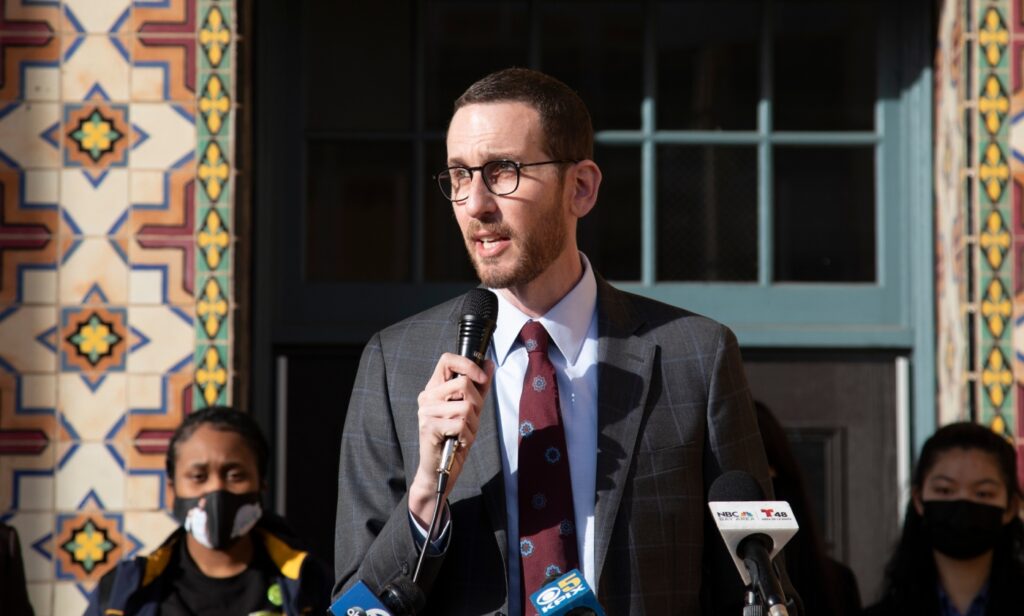
As California’s housing crisis threatens the expansion of higher education and roils college towns, state Sen. Scott Wiener Tuesday introduced a bill to streamline and boost development of student and faculty housing on state campuses.
The proposal, Senate Bill 886, exempts certain residential projects proposed by public colleges and universities on their campuses from being blocked under the auspices of the California Environmental Quality Act (CEQA). Projects would still have to meet state environmental standards, but would not be subject to lawsuits under CEQA, which has been used to stall or stifle college and university plans.
Wiener, the San Francisco Democrat and chair of the Senate housing committee, said the housing crisis has left too many students and faculty members lacking a stable place to live. “This is real,” Wiener said. “It’s affecting our young students’ ability to learn.”
The proposal was met with skepticism from a Berkeley neighborhood group leading the opposition to UC Berkeley’s long-term campus expansion plan. “It’s not clear to me that this bill is solving the problem Berkeley has,” said Phil Bokovoy, president of Save Berkeley’s Neighborhoods. A court ruling on the group’s lawsuit alleging that the university did not properly adhere to the CEQA could cut admissions by one-third this year.
The state housing crisis has hit hard on students and faculty at state colleges and community colleges. A 2021 state report found widespread homelessness and housing insecurity among students — estimating that more than 1 million students struggled with housing while taking college classes.
Wiener said the bill was being considered well before the recent court decision in the UC Berkeley battle. But he believes it will curb use of state environmental law to stall or throttle new housing projects.
The bill would cover projects on campuses in the University of California (UC), California State University (CSU), and California Community College (CCC) systems. It also requires project developers to pay construction workers the prevailing wage and use trained labor, a key provision to win support from trade organizations. The exemption does not apply to projects on farm or wetlands, in high fire zones, or redevelopment that demolishes affordable or rent-controlled housing.
Major developments would receive a ministerial review, but could mostly avoid the time-consuming and expensive delays brought by environmental challenges.
The bill is backed by pro-housing, student and faculty groups. It also received the key endorsement of the State Building & Construction Trades. Jeremy Smith, the building trades’ deputy legislative director, said the bill would ensure fair treatment for workers on important developments, and new projects would provide training for apprentices. “We don’t take CEQA streamlining lightly,” he said.
But slow-growth groups and advocates for local control over development are likely to line up against the measure.
Save Berkeley’s Neighborhoods sued the university in 2018, claiming it had violated state environmental law by failing to plan for or adequately manage the community impacts of a large enrollment increase. A state appellate court this month upheld a lower court order to freeze admissions at UC Berkeley while the lawsuit continues to be litigated, potentially cutting 3,050 new and transfer students from their incoming class.
Bokovoy said his group supports new housing for UC Berkeley students and faculty, but wants university administrators to agree to freeze admissions until they come up with answers for their housing shortfall. “The solution is within their grasp,” he said.
Faculty representatives on Tuesday said lack of housing has made it difficult for low-paid lecturers and instructors to teach in California schools. Students said housing insecurity is driving drop-out rates, high student debt and a poor quality of education.
UC Berkeley senior Josh Lewis said the suits and challenges to university expansions have limited the opportunities for a new generation of leaders. “Each denial of admission based on an outdated law, each housing project shuttered, each student forced to decide between having a home and having an education,” he said, “denies our communities forward leadership.”
The bill will face several public hearings and need Gov. Gavin Newsom’s signature to become law.
